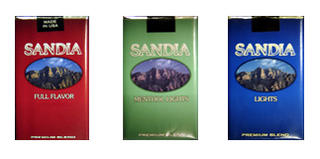TTAB Reverses 2(a) False Connection Refusal of "SANDIA" for Cigarettes
The Board reversed a Section 2(a) "false connection" refusal to register the mark SANDIA for cigarettes, finding that the mark does not falsely suggest a connection with the federally recognized tribe of the Pueblo of Sandia, New Mexico. In re WM Distribution Inc., Serial No. 78195284 (October 13, 2005) [not citable].
 Relying on Univ. of Notre Dame du Lac v. J.C. Gourmet Food Imports Co., 217 USPQ 505 (Fed. Cir. 1983), the Board noted that the elements of a Section 2(a) false connection claim are "distinctly different" from those of a Section 2(d) likelihood of confusion claim. This particular portion of Section 2(a) "resulted from the desire to give statutory effect to the notions of the rights of privacy and publicity." Therefore, the "initial and critical" requirement of this claim is that the mark allegedly appropriated must be unmistakably associated with a particular personality or persona. Following Notre Dame, the Board has enumerated the elements necessary to establish the claim:
Relying on Univ. of Notre Dame du Lac v. J.C. Gourmet Food Imports Co., 217 USPQ 505 (Fed. Cir. 1983), the Board noted that the elements of a Section 2(a) false connection claim are "distinctly different" from those of a Section 2(d) likelihood of confusion claim. This particular portion of Section 2(a) "resulted from the desire to give statutory effect to the notions of the rights of privacy and publicity." Therefore, the "initial and critical" requirement of this claim is that the mark allegedly appropriated must be unmistakably associated with a particular personality or persona. Following Notre Dame, the Board has enumerated the elements necessary to establish the claim:- applicant's mark must be the same as or a close approximation of the "person's" previously used name or identity;
- applicant's mark would be recognized as such (i.e., the mark points uniquely and unmistakably to that person);
- the person in question is not connected with the goods or services of the applicant; and
- the person's name is of sufficient fame that when it is used as applicant's mark, a connection with that person would be presumed by purchasers.
As to the first element, the PTO asserted that "sandia" is defined as "pueblo," which is a recognized tribe. However, the record showed that there are numerous Pueblo tribes, one of which is named Pueblo of Sandia, New Mexico, and that the "Sandia, New Mexico" portion of the tribe name refers to its geographic location. Moreover, as noted below, "'Sandia' has been used in numerous other contexts and has other meanings." Thus, the Board concluded, "it cannot be said that SANDIA specifically names the Pueblo of Sandia, New Mexico tribe."
As to the second element, the record did not support the contention that SANDIA uniquely and unmistakably points to the tribe, such that a connection with the tribe would be presumed.
"The term 'Sandia' has many other significant meanings, including the name of the mountain wilderness, the National Laboratories, and two towns. There are over 100 listings which include the word "Sandia" in their trade names for various businesses in the Sandia Telephone Directory. Also the term is Spanish for 'watermelon.'"
As to the fourth element, the Board concluded that, in light of the many other uses of "Sandia," the word is not famous as the name of the tribe.
There Board therefore reversed the refusal to register.

TTABlog comment: As previously mentioned at this blog, Section 2(a) false connection refusals are seldom upheld, an exception being last year's citable APACHE case. In In re White, 73 USPQ2d 1713 (TTAB 2004), the Board affirmed a Section 2(a) refusal to register the mark APACHE for cigarettes, finding that it falsely suggests a connection with the nine federally-recognized and variously-named Apache tribes. [The applicant in that case, Julie White, was the original applicant here; she assigned the SANDIA application to WM Distribution Inc.].
The Board ruled that APACHE "“would be recognized as a name, or equivalent thereof, for each of the tribes;" that the mark points uniquely and unmistakably to the Apache tribes; that Applicant has no connection with the tribes; and that the name APACHE is of sufficient fame or reputation that a connection with the tribes would be presumed by consumers of cigarettes. The evidence showed that "Native Americans not only are engaged in large-scale marketing of cigarettes, but in manufacturing of Native American brands of cigarettes."
In White the Applicant asserted that the term APACHE "does not point uniquely and unmistakably to the Apache tribes," but she failed to properly make of record her evidence of third-party registrations and applications for the mark APACHE. From the decision in this case, it looks like her attorney learned his lesson the second time around.
Text Copyright John L. Welch 2005.

0 Comments:
Post a Comment
<< Home